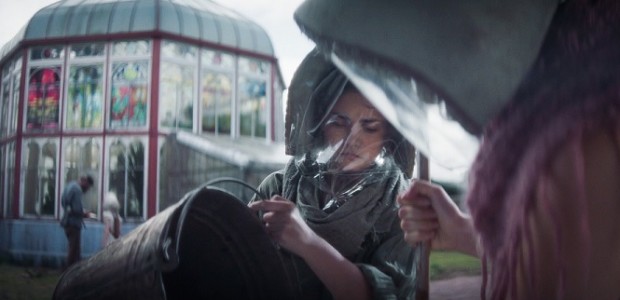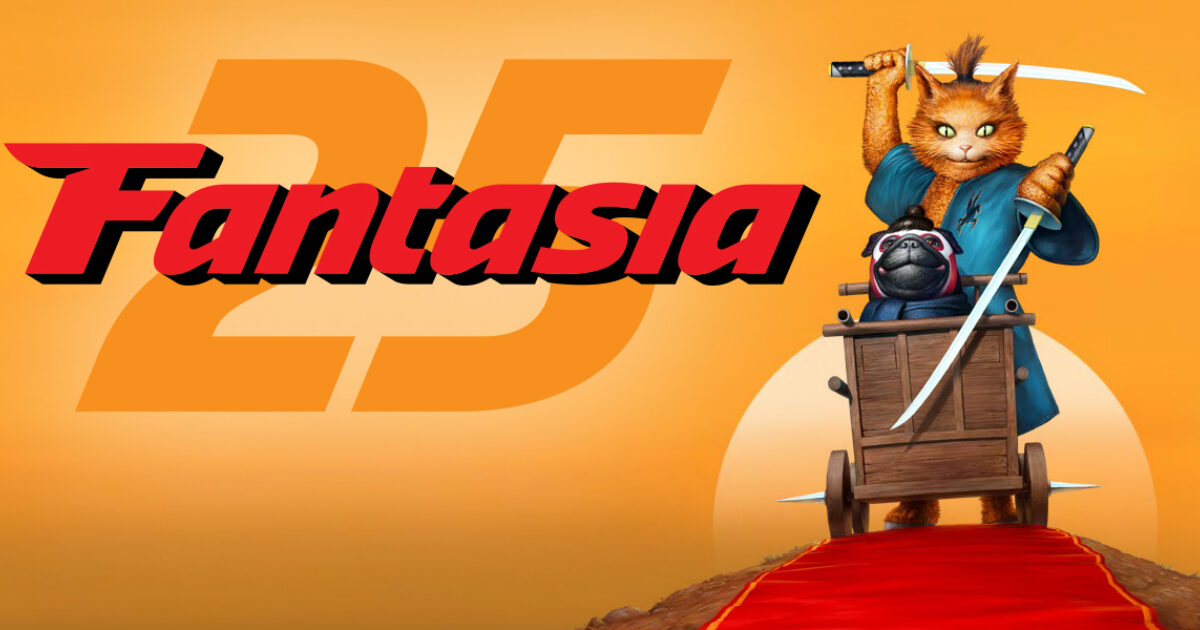When the COVID-19 pandemic began, people lamented the anticipated deluge of television and films that were to follow in its wake, expecting the usual lazy exploitation of a worldwide event. Now over a year into the crisis (with, unfortunately, no obvious end in sight), the initial rush to capitalize on it has passed by, with more thoughtful works cropping up as the pandemic continues. GLASSHOUSE is one of these films, a movie that adopts some of the iconography of life during COVID to give its post-apocalyptic tale added resonance (every character must wear their mask when venturing outside, for instance), but uses it to service a larger, more timeless parable about human resilience, the cyclical patterns of history, and the way values are both upheld and perverted over time. The film may end up being a bit too clever for its own good, distancing where it should be more intimate, but is never less than compelling.
Director/co-writer Kelsey Egan and co-writer Emma Lungiswa De Wet give GLASSHOUSE a perfectly compact set-up for a mid-budget genre movie. Somewhere in a clearing surrounded by deep woods exists the titular glasshouse, which doubles as a sanctuary and greenhouse for its few residents: matriarch Mother (Adrienne Pearce), eldest daughter Bee (Jessica Alexander), middle daughter Evie (Anja Taljaard), youngest daughter Daisy (Kitty Harris) and son Gabe (Brent Vermeulen). The family unit lead a strictly regimented existence, with Mother gently but sternly assigning each child their respective jobs and roles, all the better to keep order with. Part of this is due to the outside world having been ravaged by a virus known as The Shred, which eats away at people’s memories, sometimes to the point of erasing them completely. Gabe is clearly afflicted with a case of the virus, yet the family still have a role for him, treating him with care while any and all outsiders who come upon the glasshouse are murdered on sight, their bodies callously repurposed to suit their needs. When Bee sees an attractive Stranger (Hilton Pelser) approach the house, she suspects it may be her long-lost brother, Luca, and helps him enter the sanctuary. Tensions flare at her decision, yet the Stranger is allowed to stay, with each member of the family either seeking to utilize him or suspecting him — the latter of which they’re correct to, as he begins to manipulate his way into the fold.
Egan, production designer Kerry Van Lillienfeld, costume designer Catherine McIntosh, and cinematographer Justus de Jager create a compellingly rich visual world for the film, one which does a lot of the heavy lifting for the narrative given the script’s rather coy approach to backstory. The movie is clearly set in some ambiguous year in the future, as various bits of detritus like magazines (one such issue announcing that humanity has entered the “Age of Pandemics,” providing a little resonance to our current climate of revolving-door crises), terminology, and other objects confirm. Yet the surroundings are analogous to something more Middle Ages, with the stained-glass paintings chronicling the family’s history and the rituals Mother insists on performing feeling more ancient and pagan. In this way, GLASSHOUSE dips into Folk Horror, with everything from those rituals feeling less religious and more cult-like to the homogenous, off-white frocks and tunics worn by the family lending the film an occult vibe. Those outfits are the type that are flowing, loose, and reveal even as they conceal, so that when the predatory Stranger enters the glasshouse, they help enhance the film’s inherent eroticism. Yes, GLASSHOUSE becomes a hothouse, Egan drawing comparisons between the girls pollinating the flowers they grow and the way Bee and Evie respond to the Stranger’s attentions. The film’s sexuality falls somewhere between MIDSOMMAR (2019) and THE BEGUILED (both the 1971 and 2017 versions), with the pent-up hormones of the elder daughters being stoked by the presence of a viable man, a reaction Mother is seems to tacitly encourage.
GLASSHOUSE isn’t content with being just a Folk Horror-esque thriller chronicling the mysterious actions of the film’s ensemble in a single location, but aspires to expand its premise further, taking the concept of The Shred and applying it to the notion of how memory and tradition are intertwined with personality, behavior and values. As the film unfolds, it’s revealed that The Shred reacts differently with people depending on their age and amount of exposure, so that it can do everything from stunt a child’s development to allow an adult to selectively forget certain things. The malleability of the disease carries many implications with it, especially regarding Mother’s behavior and the various histories and roles of the characters presented. GLASSHOUSE uses this conceit to unfold its narrative and themes in a consistently compelling fashion, however it means that a bit too much information is held back — or kept in ambiguous limbo — for too long. While the film is undeniably an ensemble piece, it’s not truly character-based, as the characters tend to largely be either guarded or deceitful, never fully revealing themselves. Only poor Gabe is the most straightforward, yet even he seems to hide a deeper understanding of his surroundings, despite his fellow family members believing him to be clueless. GLASSHOUSE is saved from being a frustrating experience given that its secrets and their possible interpretations are so intriguing, but its emotional moments tend to fall flat, thanks to the viewer not knowing who — or what — to trust.
Given that it’s handling themes and material that could easily have lent itself to more obnoxious or pretentious presentation, GLASSHOUSE is admirable in the way it manages to keep its ambiguity alive all the way to the end. While some major reveals do occur, the movie leaves enough room to be discredited even when it seems to be on the level, providing imagery in flashbacks and discoveries in the final moments that would seem to contradict what’s previously been established. In most other films, this sort of thing would be more frustrating than not, but GLASSHOUSE makes its mysteries part of the entire point of its story, with the audience left in the same state of oblivion as its characters. In this way, its theme of family, history, and tradition being unreliable becomes that much more pervasive. It’s a movie that acknowledges that no single person can keep the whole history of a family alive for generations, let alone an entire people. There’s a distinct thread of “ignorance is bliss”-esque fatalism inherent in the movie — as the constantly worried Evie says to comfort Daisy, “the less you hope, the safer you’ll be.” Sad as it is, perhaps this fatalism is GLASSHOUSE’s kindest gift to those of us still in the “Age of Pandemics,” reassuring us that humanity will carry on and endure past extreme hardship, even if it has to cruelly change form to do so. Then again, the film also acts as a warning: we seem to not have a good or long enough memory to stop repeating our mistakes, and putting our trust in the hands of those who purport to remember everything — and make sacrifices on our behalf, supposedly in our best interests — is perhaps not the smartest choice. As our world and people face these very questions at present, it’s encouraging to see films like GLASSHOUSE engage current events so smoothly and intelligently.
Tags: Adrienne Pearce, Anja Taljaard, Brent Vermeulen, Catherine McIntosh, Emma De Wet, Fantasia Film Festival, Folk Horror, Heather Buckley, Hilton Pelser, Jessica Alexander, Justus de Jager, Kelsey Egan, Kerry Van Lillienfeld, Kitty Harris, South Africa




No Comments